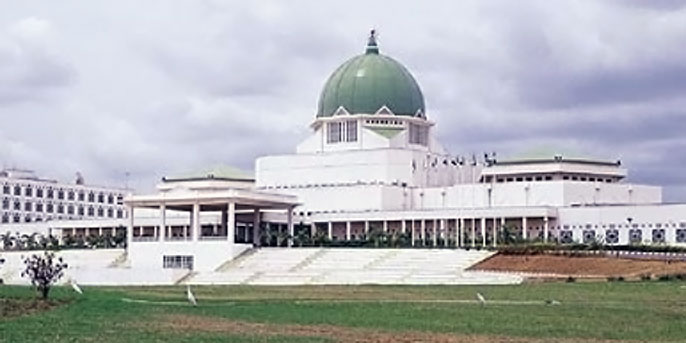By Michael Jegede
Soon after the 2019 presidential/National Assembly elections, the battle for the seats of presiding officers for the ninth Assembly began in earnest, with elected lawmakers on the platform of the ruling All Progressives Congress (APC), interested in one position or the other, publicly making their intentions known.
The APC had overwhelming victory in the elections. President Muhammadu Buhari secured a second term and the party won majority of the legislative seats, paving the way for it to produce the presiding officers in both chambers of the 9th NASS to be inaugurated in June.
While the aspirants for the NASS topmost positions were busy with consultations in the pursuit of their ambitions, APC national chairman, Comrade Adams Oshiomhole, came out with a bombshell. He announced that the governing party had endorsed the Senate Leader, Senator Ahmad Lawan from Yobe State in the Northeast, and House Leader, Hon. Femi Gbajabiamila from Lagos State in the Southwest, as the next Senate President and House of Representatives Speaker respectively.
There were threats from some APC leaders that anyone who refused to abide by the so-called party decision would be disciplined. Nevertheless, former Senate Leader, Senator Ali Ndume, a top contender for the Senate Presidency, unshakably intensified his campaign. And he seems to be making serious waves and gathering enough momentum in his push. Senator Danjuma Goje is equally assumed to be in the Senate Presidency contest, but he doesn’t appear to be as dogged as the ex-Senate Leader.
Ndume and Goje are respectively from the states of Borno and Gombe located in the Northeastern region, where the Senate Presidency was zoned to by the APC. Hon. Umar Bago (Niger) and Hon. John Dyegh (Benue) from the North Central, have likewise, not surrendered in the House Speakership tussle. They are incensed by the “unfair decision” of APC to zone House speakership to the Southwest which already has the Vice President.
With the insistence of these eminently qualified lawmakers to remain in the race, those who want to impose leaders on the ninth NASS, are reportedly scheming for the use of open ballot for the leadership election. Even when the open ballot system, is evidently against the standing rules of procedure for both the Senate and House of Reps, which prescribes secret ballot for the election of presiding officers.
The National Assembly management, headed by Mohammed Sani-Omolori, was reported to be under pressure to ignore the standing rules and conduct the election using the open ballot system. Sani-Omolori was said to have been invited as the Clerk of National Assembly, by the Economic and Financial Crimes Commission, EFCC, to answer questions relating to records of finances of the Assembly, and the mode of voting to be used for the election of leaders of the 9th NASS.
The APC after its purported endorsement of Lawan and Gbajabiamila, has continued to maintain that the open ballot method must be used, in the election for the ninth NASS leadership. The party’s spokesman, Mallam Lanre Issa-Onilu, was for instance, quoted as saying that “Secret ballot is not known to any sanitary democratic practice. It is only people with hidden agenda that look for secret ballot anywhere.” Some Civil Society Organisations (CSOs) ignorantly joined the fray to clamour for the adoption of open ballot voting for the election of the 9th NASS leaders.
As the D-day for the NASS leadership election draws nearer, should the voting system be a subject of debate, when the current Senate and House Standing Orders clearly specify that voting shall be by secret ballot? Why would anybody want the NASS management to do otherwise? Is it a way of ensuring that lawmakers-elect who vote against the supposed anointed candidates are identified and marked for punishment?
Majority of the lawmakers-elects from the APC and Peoples Democratic Party (PDP) are favourably disposed to the secret voting method. A Senator-elect, Orji Uzor Kalu, had disclosed that all the elected legislators, were unanimous in their support for the secret ballot pattern of voting, at the induction programme held for them recently. The former Abia State Governor, elected on the platform APC, to represent Abia North in the ninth Senate was reported to have said: “All of us (lawmakers-elect) have agreed during the induction programme that we would use open-secret method and we have asked the National Assembly management to provide ballot boxes and cubicles for that purpose.”
Another ex-governor from Kano State, Senator Kabiru Gaya of APC, elected for the fourth time by the people of Kano South, also insisted that the Senate standing rule which stipulates secret balloting shall be applied in the election of presiding officers for the next NASS session.
Stressing that the 2015 Senate Rule remains the valid document for use in the election of presiding officers for the Red Chamber, Gaya who has declared his intention to contest for the Deputy Senate President, asked: “Between 2011 Rule and 2015 Rule, which one comes last?” He said: “The second one supersedes the first one. I am a member of the National Assembly. And we were able to do these rules together.”
Proponents of the open ballot system have argued that it is the global standard for the election of presiding officers in the parliaments. This assertion is patently fallacious and misleading! It is not based on empirical facts, but a mere theoretical postulation by the open ballot advocates. Contrary to their claim, today, secret balloting is the commonly used method for parliamentary leadership election across the world. Apart from the United States, Isreal, Argentina, India, New Zealand, Denmark and some few others, the National Parliaments of most countries make use of secret ballot in choosing presiding officers as contained in their respective rules of procedure.
Even in the national parliaments of most parliamentary democracies – like the United Kingdom (UK), Canada, China, Australia, Germany, Italy, Spain, Belgium, Finland, Singapore, Pakistan and a host of others – where party discipline and control over elected representatives appear to be very strong, the secret ballot system have become the common rule for the election of presiding officers. The secret ballot style of voting confers freedom on the parliamentarians to vote according to their conscience, without being compelled to toe party line for fear of intimidation and victimization.
In the Canadian House of Commons, until 1985, when election by secret ballot was finally enshrined in its Standing Orders, Speakers were chosen openly by way a motion, more often than not, initiated by the Prime Minister who is the Head of Government. Only anointed candidate of the government based on political connection could emerge as a Speaker at that time. Secret ballot voting procedure was recommended by successive reform committees on the principle that “the Speaker belongs to the House, not to the Government or the Opposition.”
Following the amendment to the Standing Orders, the first speakership election by secret ballot voting system in the Canadian House of Commons was held in 1986. Thirty-nine candidates slugged it out and Rt. Hon. John Allen Fraser, a progressive conservative, after 11 rounds of secret voting, emerged victorious as the first Speaker to be directly elected by the honourable members. There was no room for imposition anymore!
Also in the British House of Commons, up until 2001, when it adopted the current system of secret ballot, Speakers had been elected openly through the conventional parliamentary motions and divisions. The election of a Speaker by the process of secret vote was held in 2009 for the first time in the parliament’s 700-year history, after the resignation of late Rt. Hon. Lord Michael Martin. The incumbent Speaker, Rt. Hon. John Bercow, then a conservative, elected into the Parliament in 1997, defeated nine other candidates, including Sir George Young, after a three-round secret ballot. Young, elected into the parliament in 1974, was believed to be the favoured candidate of the Tory leadership, yet Bercow about the youngest in age and parliamentary experience, won the contest via secret vote with the support of his fellow parliamentarians.
Information available in the PARLINE Database of the Inter-Parliamentary Union (IPU) for the Federal Parliaments of 147 countries, confirms that most parliamentary assemblies, have indeed come to embrace the secret ballot mode of election to select their leaders. IPU, established in 1889, is the global organization of national parliaments. With headquarters in Geneva, Switzerland, and a permanent observer status in the United Nations General Assembly (UNGA), it currently has 179 Member Parliaments and 12 regional parliamentary bodies as associates.
Of the 147 countries from different continents captured in IPU online record, 118 apply the secret ballot model in the election of presiding officers of their respective national parliaments, amounting to about 80%. There are 195 UN-recognized sovereign countries in the world today. Official statistics of the UN shows that the continent of Africa has 54, Asia 48, Europe 44, Oceania 14, North America 23 and South America 12.
From the accessible data about the national parliaments of 36 nations on the African continent including Nigeria, only four adopt the open ballot system for the election of their principal officers. That is just about 11%. Out of the forty-three European countries whose parliaments were examined from the data supplied by IPU, only eight which is approximately 19%, use open voting for election of their leaders.
In Asia, out of 27 nation states studied, 20 apply secret voting while 7 use open ballot (that is 74% – 26%). Of the 30 countries x-rayed from both North and South America, twenty-one (70%) employ secret balloting and nine (30%) operate open voting system. Data about the national parliaments of 11 countries in the Oceanian region were provided. Ten (90%) adopt secret ballot in the conduct of their parliamentary leadership election while only one make use of the open ballot method.
Today, what obtains for the election of principal officers in most international parliaments is the secret ballot mode – from the IPU which is made of national parliaments from across the globe to regional and sub-regional parliamentary assemblies like the European Parliament, Parliamentary Assembly of the Council of Europe (PACE), Organisation for Security and Co-Operation in Europe Parliamentary Assembly (OSCE PA), Pan African Parliament (PAP), East African Legislative Assembly (EALA) to ECOWAS Parliament and many others.
The NASS management team in conducting the leadership election, must refuse to pander to the whims and caprices of those who are bent on thwarting democratic processes, in a bid to install their lackeys and allies as presiding officers. No voting procedure other the secret ballot as prescribed by the extant rules and guidelines of both houses of NASS should be used for the election. We must understand that the independence of the legislature is vital to the growth and sustenance of democracy.
In the words of Edward Gibbon, a historian, writer and parliamentarian in the British House of Commons, “The principles of a free constitution are irrecoverably lost, when the legislative power is nominated by the executive.”
Michael Jegede, a media professional writes from Abuja













